Everything that goes into your recycling is put to good use, and all of Bristols recycling is sent to reprocessors within England and Wales.
Aluminium cans
After the aluminium cans are separated from steel cans by magnets, they are compressed into bales and sent for reprocessing. The metal is heated to remove all inks and coatings and then melted to form large blocks (ingots).
Most of the new aluminium is then rolled into sheets and sent to can makers in the UK and Europe.
Aluminium foil
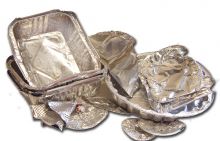
The foil is recycled separately from the cans because it has a slightly different metal content.
The process is similar to the aluminium can recycling and the finished product is used to make a range of products such as lightweight components for the car industry.
Did you know? Aluminium is the most cost effective material to recycle.
Car batteries
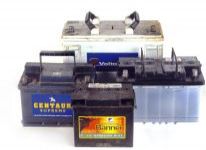
Car batteries are sent to Chester. They are broken up in a huge crushing machine and sorted into different materials. The plastic is recycled and made into many different products including recycling boxes, furniture, drainpipes and cases for car batteries!
- The lead is melted down to be used for things like more car batteries, and shields for X-ray machines in hospitals.
- The acid is treated and neutralised.
- The distilled water is purified and used again.
Cardboard
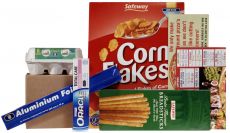
Cardboard is sent to Sittingbourne in Kent.
Cardboard is now recycled (rather than composted with garden waste and food waste) as that is a better way to make use of this resource.
It is soaked and pulped then made back into more cardboard packaging.
Engine oil
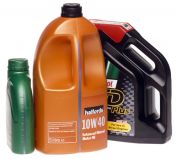
Engine oil is sent to Newport in Wales. It is decanted into a large holding tank where it is boiled up and left to settle. Any water is removed and the oil is then filtered.
This process is repeated to produce a watery brown liquid that is used in furnaces at power stations and quarries as a type of fuel.
Did you know? If you recycle just two gallons of used oil it can generate enough electricity to run the average household for almost 24 hrs
Food waste
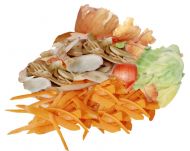
Food waste is sent to an Anaerobic Digestion Plant site in Avonmouth. The food waste is de-packaged and screened before being fed into the anaerobic digesters.
The pasteurisation stage ensures that the resulting fertiliser output is safe for application to farm land. The anaerobic digesters transform the food waste into biogas and nutrient rich fertiliser.
Anaerobic digestion is a completely natural process through which micro-organisms break down the food waste in the absence of oxygen to produce methane.
The biogas produced from the digestion can be used to provide vehicle transport fuel for our Bio-Bus and Bio-Bug, or supply homes.
Did you know? Around 9,000 tonnes of food waste was collected for composting from Bristol households in 2014.
Garden waste
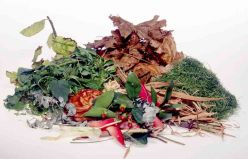
Garden waste is sent to composting sites just outside Bristol.
It is shredded then transferred to large sheds for composting, where it's piled up in long heaps called windrows.
The material is turned over and moisture, air, and temperature are monitored regularly. The process takes around 6 days to 2 weeks to produce Agricultural Grade compost.
Did you know? Compost can help to build up natural soil fertility so cuts down on the use of inorganic fertilisers.
Glass bottles and jars
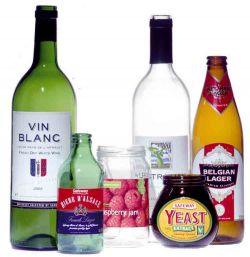
Glass bottles and jars are sent to Harlow in Essex.
The glass is crushed into cullet and each colour is melted in a separate furnace before being moulded into new glass bottles and jars.
Glass can be recycled over and over again without any loss of quality. Only glass bottles and jars are recycled as other types of glass (such as drinking glasses, light bulbs or window panes) have different ingredients, and will leave faults in the final product.
Did you know? Glass can be recycled endlessly and recycling glass requires less energy and resources than if raw materials were being used.
Household batteries
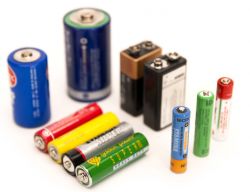
Household batteries are sent to Chester. Batteries are sorted, crushed and then screened before going through a process of washing and filtering
The various metals are then separated out for recycling. Batteries are classed as hazardous waste and so must be kept out of the normal waste stream.
It is important that batteries are not leaking or corroded when put in for recycling, as this can be hazardous to recycling crews.
Paper

Paper is sent to Aylesford in Kent.
This is the largest paper recycling plant in Europe and takes all types of paper. All inks, staples etc are washed out of the paper with soapy water in huge drums or vats.
The paper is pulped and then injected between two wire meshes to make it paper thin. It is dried, then rolled into huge reels, each weighing more than 30 tonnes. These are used to supply newsprint to all the national newspapers in this country.
Did you know? Newspapers can be back on the newsagents shelves in as little as seven days.
Plastic packaging

Plastic packaging is sent to Corby in Northamptonshire.
Plastic is baled and sent for reprocessing, where the plastic is broken down into flakes and then cleaned. These are melted down and moulded into new plastic shapes.
Plastic bottles, tubs and trays are made into items such as bollards, recycling boxes, compost bins, drainage pipes, and park benches. They can also be made into new food and drinks packaging and even fleece jackets.
Did you know? A plastic bottle can be recycled into another plastic bottle within as little as six weeks.
Spectacles
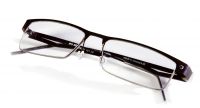
Spectacles are passed to a charity in Crawley, Sussex for sorting.
Spectacles are passed on to the charity Vision Aid Overseas (VAO), who take them to developing countries to help improve the sight of people who would otherwise not have access to any professional eye care.
Only suitable and undamaged spectacles can be sent for use overseas, but unsuitable spectacles are separated into metal and plastic frames for further recycling, to raise money for the charity.
Steel tins and aerosols
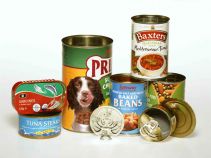
Steel tins and aerosols are sent to Port Talbot in South Wales.
Steel cans are separated from aluminium ones by magnets in Bristol, and then baled and sent for reprocessing. The steel cans are put into a furnace, along with molten iron, heated to 1,700C and refined into new steel.
The pure metal is made into blocks (ingots), which are rolled into sheets of varying thickness. Different grades are used to make things like car doors, fridges, bridges or more steel cans. Old cans can be made into new ones in just 33 days.
Textiles and shoes
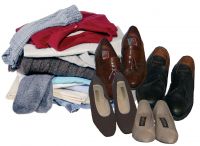
Textiles and shoes are sent to Bilston in the West Midlands.
Reusable clothes and shoes are sorted by hand and then sent abroad where there is a strong market for second hand clothes. Old shoes need to be in pairs, which is why we ask you to tie them together.
It is important that all textiles are kept dry, because damp clothing is likely to get attacked by mildew.
Tetra Paks (cartons)
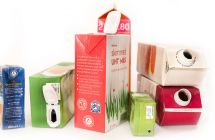
Tetra paks are sent to Sittingbourne in Kent.
These are baled and sent to Kent where they are dropped into huge water filled vats and pulped for 20 minutes. This separates the board from the polyethylene or aluminium linings.
The board is made into new cardboard, brown paper or envelopes. Remaining materials can be used to make broom handles, roof tiles or even
garden furniture. Alternatively, the aluminium may be removed for recycling separately and the other materials used to generate energy.
Bulky waste items
Good quality items that are collected from Bristol's homes are sent to SOFA Project in Old Market for reuse. Electrical items are given safety checks and furniture items are refurbished where necessary. They are then sold on to people on low incomes.
Any items that are not suitable for reuse are sent to New Earth Solutions site in Avonmouth for disposal.
What happens to waste that can't be recycled?
Just under two-thirds of Bristol's residual (wheelie-bin) waste (approx 54,000 tonnes) will be taken to a Mechanical Biological Treatment plant at Avonmouth.
At the plant, further recyclable material is recovered from the waste and sent for reprocessing. From the remaining material, a fuel is produced along with a compost-like product that is used for improving land quality.
